Practicum Opportunities
LOCAL PRACTICUM PLACEMENT: Human Rights students are able to complete domestic practicum placement in Winnipeg-based agencies in Fall, Winter or Spring term.
Human Rights students who are interested in enrolling in the practicum placement (HR-3510) course must contact the Practicum Coordinator Ruth Taronno, who will provide you with a practicum placement application and up to date information about possible placements.
At least three months prior to the beginning of a local placement, international students may need to register for a Coop Work Permit by contacting Ali Raza, Immigration Student Advisor.
INTERNATIONAL PRACTICUM PLACEMENT:
In addition to the normal international practicum procedures, interested students must apply for permission to the University of Winnipeg Risk Assessment Department. Contact the HR Practicum Coordinator, Ruth Taronno, at least 8 months prior to placement for more information.
About
The Human Rights practicum (HR-3510) at the Global College provides an opportunity for students to integrate classroom theory and knowledge with practice and work in the area of human rights through supervised field work and structured assignments. The practicum also involves participation in specified seminars, written reflection, and analyses. Volunteer work will focus on the framework of global citizenship, social justice, and human dignity. The goal of practicum placement is to introduce students to practical work experience that helps them to apply theoretical knowledge to real-life situations and to think about how those very experiences may also trouble, nuance, and challenge their understandings of human rights.
Academic Credit
Upon successful completion of the practicum placement, students receive 3 or 6 hours of academic credit towards a 4-year Bachelor of Arts in Human Rights.
Eligibility and Prerequisites
A practicum placement is mandatory for a 4-year BA degree in Human Rights, while it is elective for a 3-year BA degree in Human Rights. Enrolment to practicum placement is subject to approval of the Practicum Coordinator – Ruth Taronno - who reviews students’ eligibility based on factors, such as academic standing, placement plan/proposal, and participation in academic activities. In addition to eligibility review, students must have completed the following courses:
• HR-2100 Concepts and Conventions in Human Rights and
• HR-2200 History of Human Rights in Canada
Note: the former HRGS-2101 and the former POL-2101 are the equivalents to HR-2100 and HR-2200.
Local Practicum
Local practicum placements provide students with an opportunity to broaden their human rights learning and develop network and relationships with local human rights organizations. It offers the chance to engage in meaningful community development at home and encourage civic responsibility.
Local Practicum Timeline and Checklist:
• At least 3 months before starting the practicum, initiate a meeting with the Human Rights Practicum Coordinator to discuss your practicum interests, plans, hopes, and potential practicum sites.
• Once you have decided on a practicum site, initiate contact with the potential partner organizations. Remember that it is student’s initiative to search for and find a practicum placement organization / agency, but this list provides suggestions for possible placements.
• Prepare and Submit a Practicum Application and Practicum Proposal that will describe your intended organization and outline expected dates, activities, and learning objectives.
• Upon approval of the proposal, register for the practicum course (HR-3510) through WebAdvisor and facilitated by Global College (typically the Office Coordinator). The practicum course can be completed for 3 credit hours or 6 credit hours. The 3 credit hours placement spans throughout one semester with 80 hours of volunteer dedication, while the 6 credit hours placement spans throughout 2 semesters, with 160 hours of volunteer dedication time. Students will pay the regular tuition fee for a three- or six-credit hour course.
• Following an orientation seminar with the Practicum Coordinator, begin your practicum placement, as per arrangements with your Site Supervisor.
• Your site supervisor will complete a final practicum evaluation.
• Meet with the Practicum Coordinator for a practicum-culminating meeting/seminar.
International Practicum:
In addition to the normal international practicum procedures, interested students must apply for permission to the University of Winnipeg Risk Assessment Department. Contact the HR practicum director at least 8 months prior to placement for more information.
International Practicum Timeline and Checklist:
• At least 6 months (preferably 12) before starting the practicum, initiate a meeting with the Human Rights Practicum Coordinator to discuss your practicum interests, plans, hopes, and potential practicum sites.
• Research possible regions and countries you might be interested in living in and organizations working for. Remember that it is student’s initiative to search for and find a practicum placement organization / agency, but this list provides suggestions for possible placements.
• Consult Travel Advice and Advisories https://travel.gc.ca/travelling/advisories for risk assessments of the countries you are considering. Research the culture, language, religion, economy, politics, geography, and weather of the area you are considering living in.
• Once you have decided on your practicum site(s), initiate contact with the potential partner organization(s).
• Submit a Practicum Application and Practicum Proposal that will describe your intended organization and outline expected dates, any pre-placement preparation activities (e.g. language training), and learning objectives.
• Upon approval of the proposal, register for the practicum course (HR-3510) through WebAdvisor and facilitated by Global College (typically the Office Coordinator). The international practicum course is completed for 6 credit for the duration of 3 months. Students will pay the regular tuition fee for a six-credit hour course.
• Start working on developing a travel budget. Conduct some research and apply for any bursaries and scholarships that may help your planned trip a reality. Start with the Global College’s Dr. Douglas W. Leatherdale Global Citizenship Internship Program Scholarship. Check out Global College and University of Winnipeg websites for internal and external awards and scholarships.
• It is important to check the 'pre-departure documents' prior to attending the pre-departure orientation session.
• Following an orientation seminar with the Practicum Coordinator, begin your international practicum placement, as per arrangements with your Site Supervisor. EMBRACE THE ADVENTURE!
• Your site supervisor will complete a final practicum evaluation.
• Meet with the Practicum Coordinator for a practicum-culminating meeting/seminar.
• Make a public presentation arranged by Global College sharing your international work / volunteer experience with faculty members and prospective practicum students.
Helpful Information for International Travel
• Passports: Canadian Passport Applications, 433 Main Street, Winnipeg, Manitoba
• Immunizations: visit https://travel.gc.ca/travelling/health-safety/vaccines for health concerns and vaccines. You may want to contact Travel Health and Tropical Medicine services (WHRA) to book an appointment. Their address is 490 Hargrave Street, Winnipeg, MB, R3A 0X5, and phone number is 204-940-8747
To book an appointment with Practicum Coordinator, please contact Ruth Taronno – Human Rights Practicum Coordinator, Global College, University of Winnipeg
Email: r.taronno@uwinnipeg.ca
HR Practicum Experiences
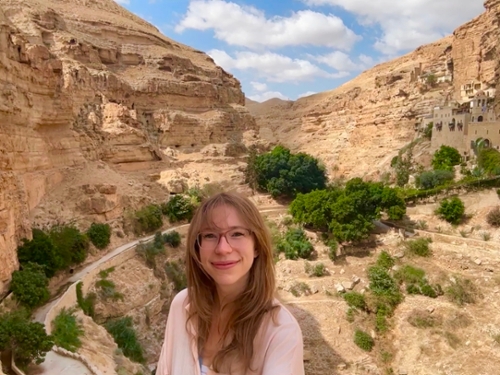
Rielle Miller, Human Rights Student
Wi'am: The Palestinian Conflict Transformation Center - Bethlehem, Palestine
Rielle spent three months working with Wi’am: The Palestinian Conflict Transformation Center in Bethlehem, Palestine. Wi’am works to promote values of restorative justice, reconciliation, non-violence, and diplomacy. The organization has many branches, with work being done via women’s programs, workshops, mediation (both traditional Arabic methods and Western models), youth/children programs, and hosting educational tours for foreigners.
“This experience drastically changed and informed my understanding of human rights, advocacy work, and justice. My placement with Wi’am challenged many of my assumptions, biases, and prior learning while at the same time increased my understanding of personal responsibility, community, and what it means to actualize human rights standards and norms. I believe that the knowledge gained from this experience could not be touched solely in the classroom and this experience has forever changed my life.”
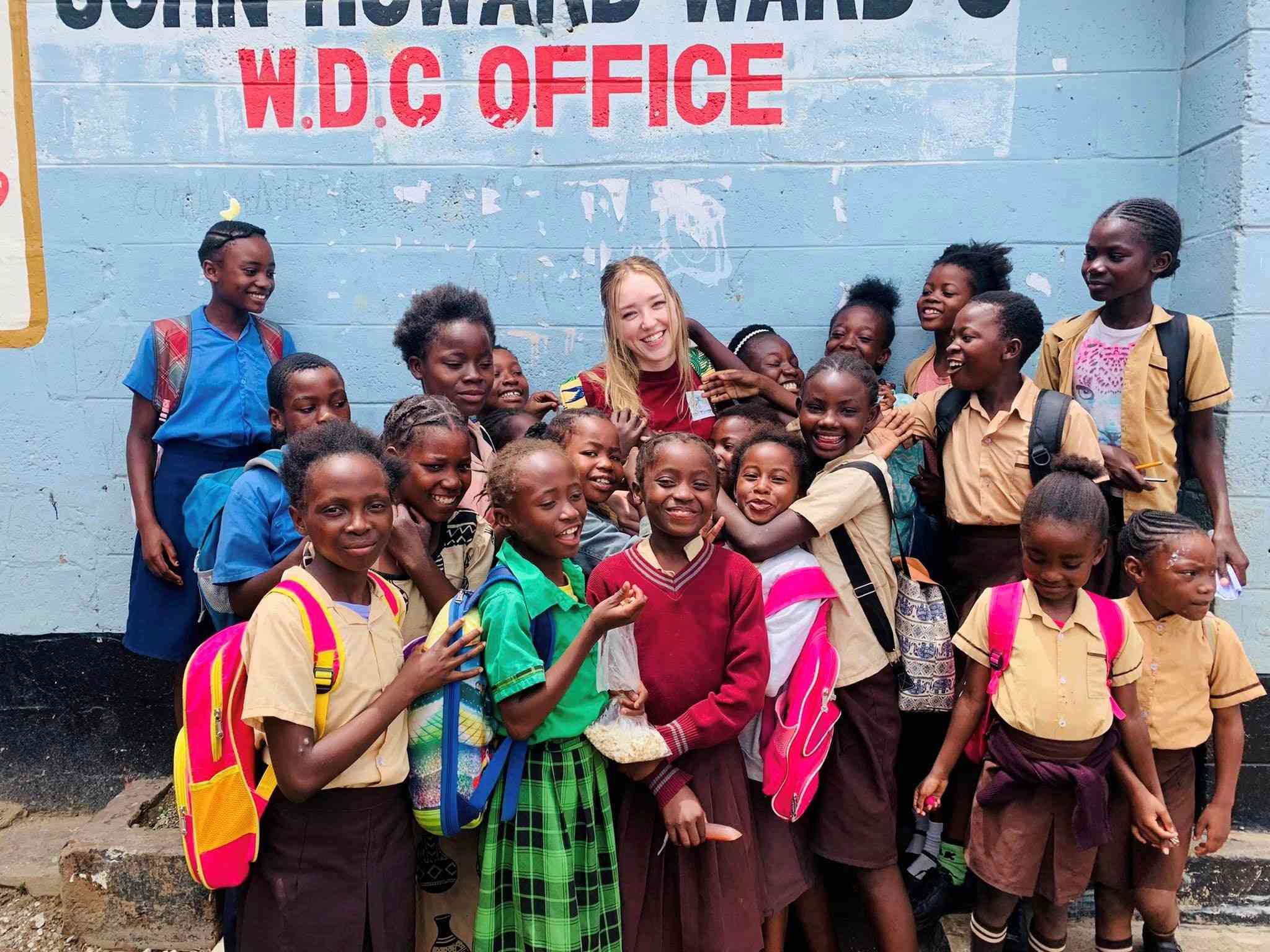
Meagan Dutka, Human Rights & Conflict Resolution Studies Student
Eagles of Change - Lusaka, Zambia
Meagan spent three months working with Eagles of Change in the fight against substance abuse in Zambia. Among her many tasks was supporting schools in teaching youth about substance abuse and mental health issues. This practicum placement exposed her to valuable opportunities for learning, growth, networking, and skills development, particularly in the area of leadership and conflict resolution.
“I am incredibly grateful for the opportunity to work alongside Eagles of Change in the fight against substance abuse. My placement with Eagles of Change allowed me to implement the skills I have learned throughout my degree and demonstrated just how much I have gained from my time at the University of Winnipeg. If I could leave my fellow students with one piece of advice, it would be to never turn down an opportunity to travel and experience cross-cultural learning. It will fundamentally change your life and who you are as a person, for the better.”
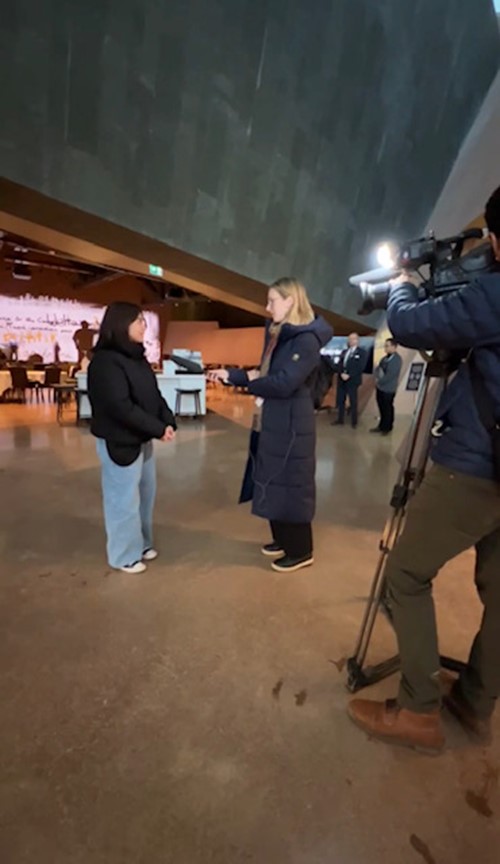 Lauren Jersey Salazar, Human Rights Student
Lauren Jersey Salazar, Human Rights Student
Canadian Museum for Human Rights - Winnipeg, Manitoba
Lauren spent three months in Canadian Museum for Human Rights working as a volunteer ambassador. She was responsible in helping visitors navigate through the museum, providing and distributing information regarding CMHR programs and gathering feedback from visitors on their visitor experience. The Canadian Museum for Human Rights consistently analyzes ways to make everything inclusive to all regardless of culture, race, language, gender, or ability.
“Being able to practice what I have learned throughout my university education was an amazing experience as I continue to learn more about human rights. The organization that I worked with focuses on making an inclusive and accessible place. The Canadian Museum for Human Rights always makes sure that all people have the right to participate and access information within the museum."
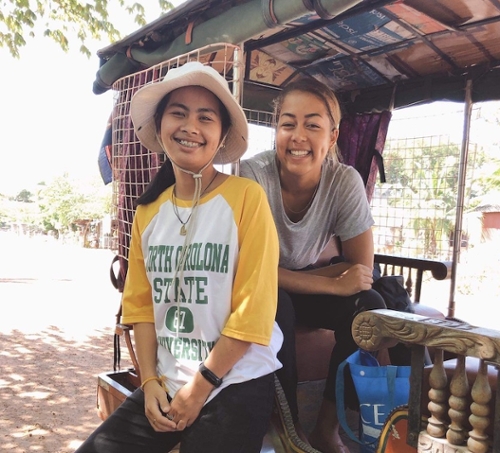 Michelle Friesen, Human Rights Student
Michelle Friesen, Human Rights Student
Gender and Development for Cambodia - Phnom Penh, Cambodia
Michelle spent three months in Phnom Penh working on the communications team for Gender and Development for Cambodia (GADC). GADC is a non-profit organization that advocates for gender equality in Cambodia. Through several capacity development projects and regular advocacy and outreach work, GADC works to further women's rights in the region and provides the necessary resources and education for community members to engage with their work as well.
"I had an amazing time working with GADC. I felt so lucky to complete my practicum with such a hardworking and committed group of people. This experience allowed me to put my classroom knowledge to work, I developed new skills, fell in love with a new culture, and walked away with some incredible friendships."
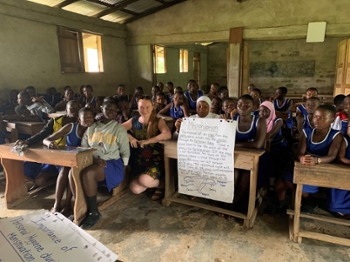 Mackenzie Harcus, Human Rights Student
Mackenzie Harcus, Human Rights Student
GhanaFLOWER - Asamankese, Ghana
"My practicum experience working with GhanaFLOWER has been my biggest accomplishment of my life thus far. I was able to apply the skills and theories I have learnt in the human rights program to a grassroots organization in another part of the world. I developed meaningful relationships and connections with an amazing group of people and expanded my worldview and my understanding of global citizenship. I am so thankful for the experiences I had and the people I met through my practicum."
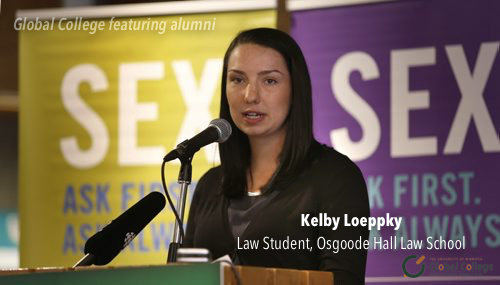
Kelby Loeppky, Human Rights Student
Manitoba Human Rights Commission
"My practicum at the Manitoba Human Rights Commission (MHRC) built on my understanding of human rights laws and systems from my degree. The MHRC helped me to develop a practicum based on my interest areas and skills. I assisted with the investigation of human rights complaints, assisted with presentations for employers and teachers on human rights law, and conducted research on contemporary human rights issues. From this experience I gained not only invaluable research, analytical, and communication skills, but also incredible relationships, mentorship, and meaningful participation in the advancement of human rights in Manitoba."
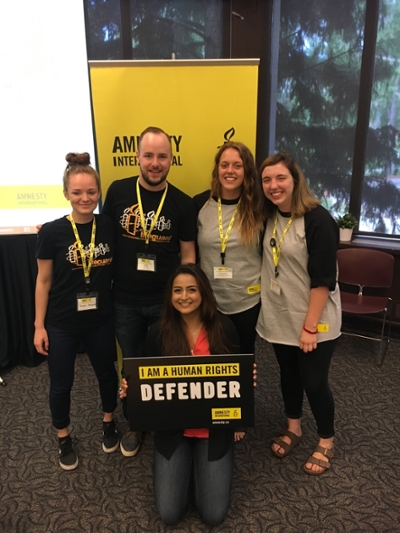
Rachael Howgate, Human Rights Student
Amnesty Internation Group 19
"My practicum with Amnesty International was very flexible. It gave me the freedom to choose what human rights issues I wanted to focus on and how I wanted to make a difference. I decided to organize school presentations to educate youth on how they can take action in Winnipeg! I was also lucky enough to attend Amnesty International Canada's AGM in Calgary to connect with other young people from across the country."
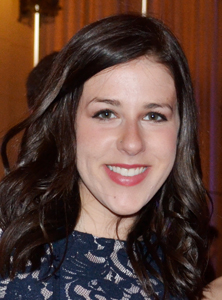
Maddie Pearlman, Human Rights Student
Immigrant and Refugee Community Organization of Manitoba (IRCOM)
"IRCOM provides a space that is assisting and empowering a global community. IRCOM’s current three hundred tenants are from more than twenty countries, bringing a magnitude of different cultural, ethnic and religious practices and norms.
Fulfilling my practicum in the kids summer program meant being a role model for the kids and youth at IRCOM on a daily basis. I felt comfortable and included in the community of the program staff. My two months at IRCOM has given me the opportunity to meet some of the most inspirational and resilient individuals, whom I hope will remain in my life for a long time to come. Every day with those kids had an undeniable impression on me and pushed me to be the best that I can be."
